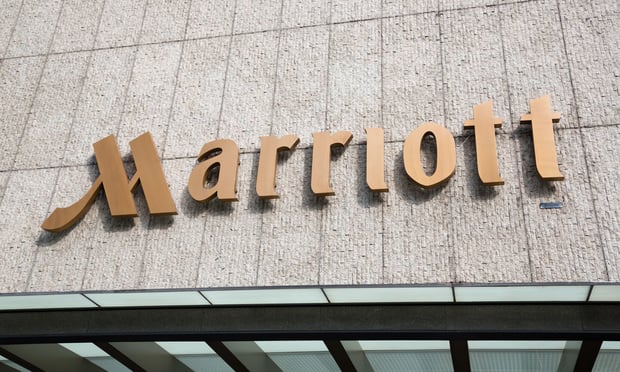Sex Trafficking Claims Can Proceed Against Marriott, Phila. Federal Judge Rules
U.S. District Judge Mark Kearney said a 2008 law against sex trafficking was intended to create liability for those who benefit from activities they "knew or should have known" involved the practice.
April 23, 2020 at 06:40 PM
5 minute read
 Photo: DoublePHOTO studio/Shutterstock.com
Photo: DoublePHOTO studio/Shutterstock.com
A federal judge has allowed a sex trafficking plaintiff to proceed with claims against hotel franchise Marriott over allegations that it failed to stop those activities at three of its franchisee hotels in Philadelphia.
U.S. District Judge Mark Kearney of the Eastern District of Pennsylvania on Wednesday, wading into an emerging field of litigation and case law, denied Marriott International's efforts to dismiss the lawsuit on the pleadings.
The opinion in the case, captioned A.B. v. Marriott International, hinged on the interpretation of 2008 amendments to federal anti-trafficking laws allowing for civil liability, and marks the first time a district court under the U.S. Court of Appeals for the Third Circuit has addressed the act.
Marriott, which was represented by Baltimore-based DLA Piper attorney Michael O'Day, argued that it could only be held liable for conduct at its franchisees if it had committed an overt act facilitating the conduct.
But Kearney disagreed, saying the law clearly intended to create liability for those who benefit from activities they "knew or should have known" involved trafficking.
The decision is a win for plaintiffs counsel Jerry Kristal, managing attorney in the Cherry Hill, New Jersey, office of Weitz & Luxenberg.
The plaintiff was identified only by the initials A.B. in the opinion.
"Although A.B.'s amended complaint is not a model of clarity, we do not view it as an attempt to create a new theory of liability on a business failing to affirmatively prevent sex trafficking," Kearney said. "Rather than reading her claims as seeking to impose a duty to prevent trafficking, we read A.B.'s amended complaint as seeking the civil remedy Congress gave victims of sex trafficking against 'whoever knowingly benefits' from participation in a venture the person 'knew or should have known engaged' in a violation of the act."
Kearney's ruling comes as sex trafficking awareness is on the rise, and sex trafficking litigation is on the rise across the country, especially against hotels. His ruling noted that there have already been efforts to form a federal multidistrict litigation focused on sex trafficking claims against hotels, and federal courts in Ohio, Washington and Georgia have already handled similar motions to dismiss in lawsuits against hotel chains.
READ THE OPINION:
According to Kearney's 48-page opinion, from 2009 through 2011 the plaintiff, A.B., was trafficked at three hotels near the Philadelphia airport that were franchised by Marriott.
In arguing that the company should have been aware of the trafficking, Kearney said A.B. alleged there was a "constant stream of male visitors" that went "straight from the main lobby and front doors so that the foot traffic was both voluminous and obvious." He further said A.B. contended her traffickers paid for rooms with prepaid credit cards at least a week at a time, the hotel staff were aware of her presence, the rooms would be "littered with multiple broken objects, used condoms, and other sex paraphernalia" after she left, staff would have seen signs of bruising on her, and would have heard frequent and loud altercations.
Hotel surveillance footage and complaints from other patrons should have created enough red flags to constitute constructive notice that either drug dealing or prostitution was going on, A.B. alleged.
A.B. also argued that Marriott benefited from the trafficking, since the hotel owners paid about 10% of their revenue to the company.
In arguing that Marriott had an agency relationship with the three hotels, A.B. argued that the company had the ability to enforce its standards through period inspections and could terminate its agreement if things were not up to par. She further contended the company handled the online booking, the rewards programs, set wages, made advertising and employment decisions, fixed prices, and shared profits, among other things.
A.B. brought claims under both Pennsylvania's anti-trafficking laws and the federal law, referred to as Section 1595 of the William Wilberforce Trafficking Victims Protection Reauthorization Act of 2008, which added civil remedies to existing criminal statutes targeting trafficking.
Marriott had argued that Kearney should follow case law from the Northern District of Georgia, which has found plaintiffs need to show the hotels engaged in an "overt act" facilitating the trafficking. Kearney, however, said he found case law from the Southern District of Ohio, which focused on the "should have known" language, to be more persuasive.
"We are persuaded the clear language of Section 1595 favors the approach taken by Judge [Algenon] Marbley focusing on a hotel's possible civil liability best conforms to Congress's intent amending the act to include a civil remedy provision, at least as applied to a hotel where there is a direct connection between a rental fee for the room where the trafficking is effected," Kearney said. "While these allegations may ultimately be proven untrue or unsupported by evidence, the allegations at the moment to dismiss stage are sufficient to meet the 'knowingly benefited' element of a civil claim."
In an emailed statement, a Marriott spokesman declined to comment.
Neither defense counsel O'Day nor plaintiffs attorney Kristal immediately returned calls seeking comment.
This content has been archived. It is available through our partners, LexisNexis® and Bloomberg Law.
To view this content, please continue to their sites.
Not a Lexis Subscriber?
Subscribe Now
Not a Bloomberg Law Subscriber?
Subscribe Now
NOT FOR REPRINT
© 2025 ALM Global, LLC, All Rights Reserved. Request academic re-use from www.copyright.com. All other uses, submit a request to [email protected]. For more information visit Asset & Logo Licensing.
You Might Like
View All

'Close Our Borders?' Senate Judiciary Committee Examines Economics, Legal Predicate for Mass Deportation Proposal
3 minute read
Duane Morris Adds Whiteford Hospitality Chair to 'Litigation-Heavy' Pittsburgh Office
3 minute readLaw Firms Mentioned
Trending Stories
- 1States Accuse Trump of Thwarting Court's Funding Restoration Order
- 2Microsoft Becomes Latest Tech Company to Face Claims of Stealing Marketing Commissions From Influencers
- 3Coral Gables Attorney Busted for Stalking Lawyer
- 4Trump's DOJ Delays Releasing Jan. 6 FBI Agents List Under Consent Order
- 5Securities Report Says That 2024 Settlements Passed a Total of $5.2B
Who Got The Work
J. Brugh Lower of Gibbons has entered an appearance for industrial equipment supplier Devco Corporation in a pending trademark infringement lawsuit. The suit, accusing the defendant of selling knock-off Graco products, was filed Dec. 18 in New Jersey District Court by Rivkin Radler on behalf of Graco Inc. and Graco Minnesota. The case, assigned to U.S. District Judge Zahid N. Quraishi, is 3:24-cv-11294, Graco Inc. et al v. Devco Corporation.
Who Got The Work
Rebecca Maller-Stein and Kent A. Yalowitz of Arnold & Porter Kaye Scholer have entered their appearances for Hanaco Venture Capital and its executives, Lior Prosor and David Frankel, in a pending securities lawsuit. The action, filed on Dec. 24 in New York Southern District Court by Zell, Aron & Co. on behalf of Goldeneye Advisors, accuses the defendants of negligently and fraudulently managing the plaintiff's $1 million investment. The case, assigned to U.S. District Judge Vernon S. Broderick, is 1:24-cv-09918, Goldeneye Advisors, LLC v. Hanaco Venture Capital, Ltd. et al.
Who Got The Work
Attorneys from A&O Shearman has stepped in as defense counsel for Toronto-Dominion Bank and other defendants in a pending securities class action. The suit, filed Dec. 11 in New York Southern District Court by Bleichmar Fonti & Auld, accuses the defendants of concealing the bank's 'pervasive' deficiencies in regards to its compliance with the Bank Secrecy Act and the quality of its anti-money laundering controls. The case, assigned to U.S. District Judge Arun Subramanian, is 1:24-cv-09445, Gonzalez v. The Toronto-Dominion Bank et al.
Who Got The Work
Crown Castle International, a Pennsylvania company providing shared communications infrastructure, has turned to Luke D. Wolf of Gordon Rees Scully Mansukhani to fend off a pending breach-of-contract lawsuit. The court action, filed Nov. 25 in Michigan Eastern District Court by Hooper Hathaway PC on behalf of The Town Residences LLC, accuses Crown Castle of failing to transfer approximately $30,000 in utility payments from T-Mobile in breach of a roof-top lease and assignment agreement. The case, assigned to U.S. District Judge Susan K. Declercq, is 2:24-cv-13131, The Town Residences LLC v. T-Mobile US, Inc. et al.
Who Got The Work
Wilfred P. Coronato and Daniel M. Schwartz of McCarter & English have stepped in as defense counsel to Electrolux Home Products Inc. in a pending product liability lawsuit. The court action, filed Nov. 26 in New York Eastern District Court by Poulos Lopiccolo PC and Nagel Rice LLP on behalf of David Stern, alleges that the defendant's refrigerators’ drawers and shelving repeatedly break and fall apart within months after purchase. The case, assigned to U.S. District Judge Joan M. Azrack, is 2:24-cv-08204, Stern v. Electrolux Home Products, Inc.
Featured Firms
Law Offices of Gary Martin Hays & Associates, P.C.
(470) 294-1674
Law Offices of Mark E. Salomone
(857) 444-6468
Smith & Hassler
(713) 739-1250






